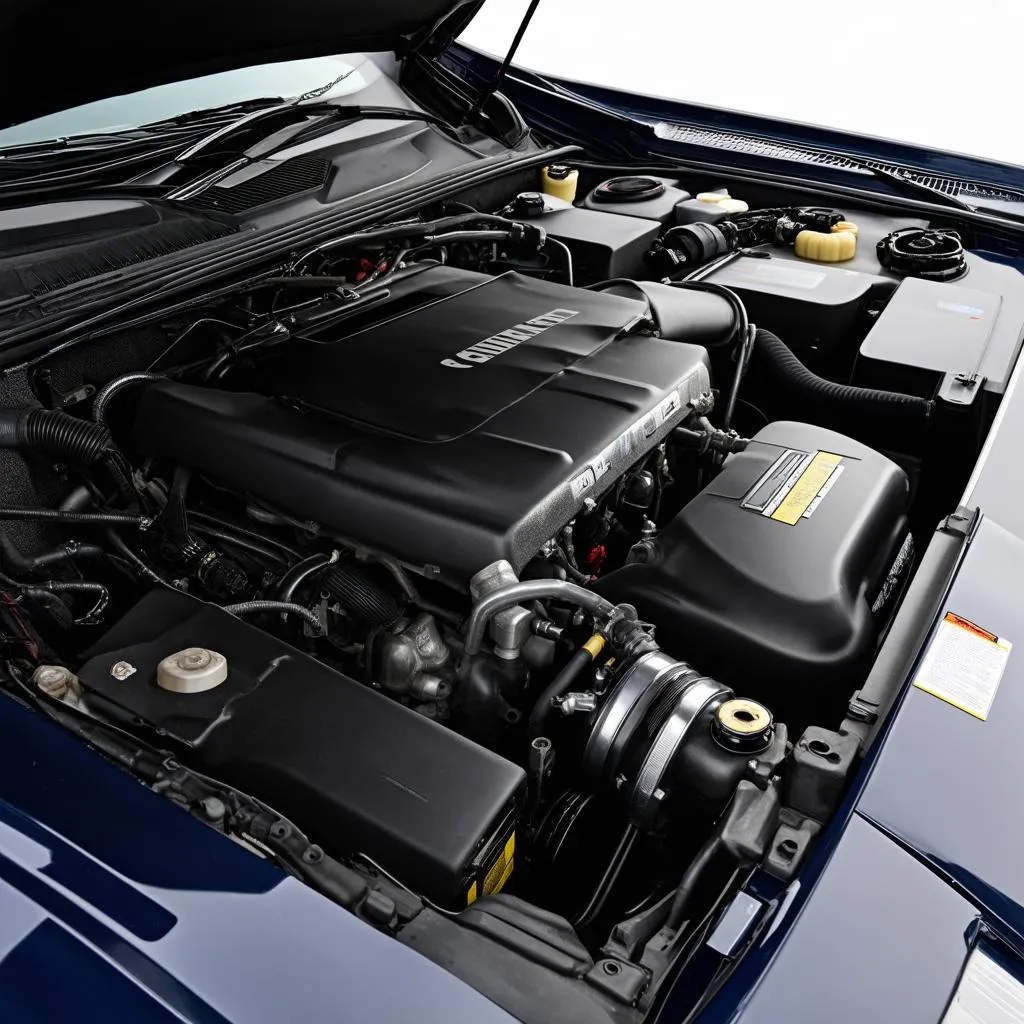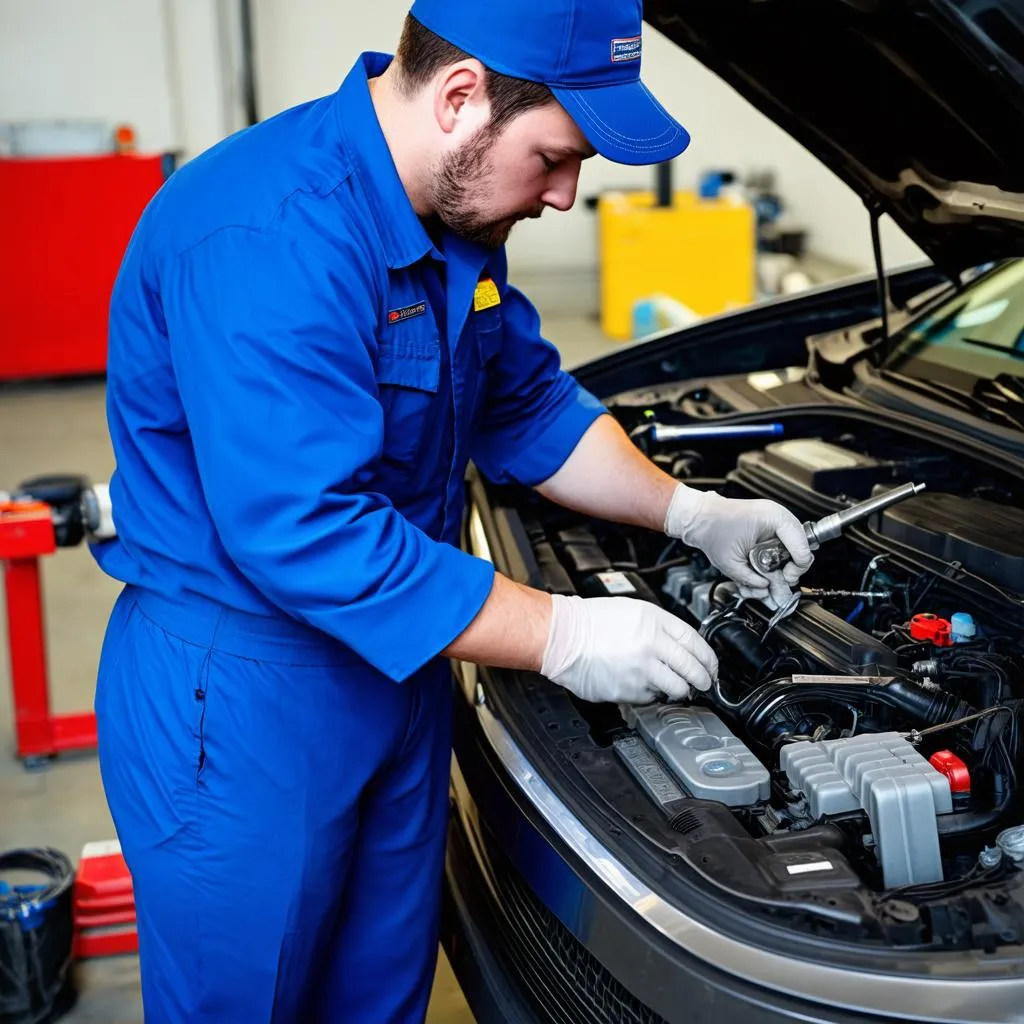“Vroom… Vroom… splutter…” Does that sound familiar? You hit the gas, expecting a surge of power, but instead, your car hesitates, stutters, or just plain refuses to cooperate. We’ve all been there – that frustrating moment when your Car Lags When Accelerating. But fear not, dear driver! This article will delve into the common causes of this automotive annoyance and provide you with the knowledge to get your ride running smoothly again.
What Does “Car Lags When Accelerating” Mean?
Before we jump into the solutions, let’s make sure we’re speaking the same language. Picture this: you’re cruising down Sunset Boulevard in your Chevrolet Camaro, and the light turns green. You press the accelerator, expecting that satisfying roar of the engine, but instead…nothing. Or worse, a delayed response. That, my friends, is acceleration lag. It’s the delay between you pressing the gas pedal and your car actually responding with increased speed.
From a mechanic’s perspective, this lag points to a disruption in the complex dance between your engine, fuel system, and transmission. It’s like a miscommunication in the car’s nervous system, preventing it from reacting to your commands swiftly.
Why Does My Car Lag When Accelerating?
There are a myriad of reasons why your car might be experiencing this sluggish behavior. Let’s break down some of the most common culprits:
1. Fuel System Issues:
- Clogged Fuel Filter: Just like your Brita filter needs changing, your car’s fuel filter can get clogged with impurities over time. This restriction can choke your engine’s fuel supply, causing hesitation, especially during acceleration when demand is high.
- Faulty Fuel Pump: This hardworking component is responsible for delivering fuel from the tank to the engine. A weak or failing fuel pump struggles to keep up, leading to inadequate fuel delivery and, you guessed it, acceleration lag.
- Dirty or Failing Fuel Injectors: These tiny nozzles spray a precise amount of fuel into the engine cylinders. Over time, they can become clogged or malfunction, disrupting the air-fuel mixture and hindering performance.
2. Air Intake and Sensor Problems:
- Dirty Air Filter: Your engine needs to breathe, and a dirty air filter can suffocate it. This restriction starves the engine of oxygen, leading to sluggish acceleration and reduced power.
- Mass Airflow Sensor (MAF) Malfunction: This sensor acts like the lungs of your car, measuring the amount of air entering the engine. A faulty MAF sensor sends incorrect readings to the engine control unit (ECU), wreaking havoc on the air-fuel mixture and causing all sorts of performance issues, including acceleration lag.
3. Transmission Troubles:
- Worn-Out Transmission Fluid: Just like engine oil, transmission fluid degrades over time. Old, dirty fluid can’t lubricate and cool the transmission components effectively, leading to slipping, rough shifting, and yes, acceleration lag.
- Transmission Problems: More serious transmission problems, like a failing torque converter or solenoid issues, can also manifest as acceleration lag. These issues usually require professional diagnosis and repair.
4. Other Potential Culprits:
- Spark Plug Issues: Worn-out or fouled spark plugs can cause misfires, which can lead to hesitation and a lack of power during acceleration.
- Vacuum Leaks: Hoses and seals in your engine’s vacuum system can develop leaks, disrupting airflow and throwing off the delicate balance required for optimal performance.
- Exhaust System Restrictions: A clogged catalytic converter or other exhaust restrictions can create backpressure, hindering your engine’s ability to exhale properly and causing sluggish acceleration.
What Should I Do If My Car Lags When Accelerating?
First, don’t panic! While experiencing acceleration lag can be unnerving, it’s usually a sign of a solvable problem.
Here’s a step-by-step guide on what to do:
- Take Note: Pay attention to when the lag occurs, any accompanying symptoms (like strange noises or warning lights), and how long the problem has been happening. This information will be helpful when diagnosing the issue.
- Check the Easy Stuff First: Before rushing to the mechanic, start with the simple things. Inspect your air filter and replace it if it’s dirty. Check your owner’s manual for the recommended fuel filter replacement interval and replace it if necessary.
- Consult a Professional: If the easy fixes don’t solve the problem, it’s time to call in the cavalry. A qualified mechanic with a dealer scanner for European cars, like those found at reputable repair shops, can diagnose the issue accurately. They have the tools and expertise to pinpoint the root cause of the acceleration lag and recommend the appropriate repairs.
 Car Engine
Car Engine
Frequently Asked Questions About Car Acceleration Lag:
1. Can a dirty air filter cause acceleration lag?
Absolutely! A clogged air filter restricts airflow to the engine, starving it of oxygen and leading to reduced power and acceleration lag. Think of it as trying to run a marathon with a stuffy nose.
2. Is it safe to drive my car if it’s lagging?
While driving with slight acceleration lag might be possible for a short distance, it’s not recommended. Ignoring the problem can lead to further damage and potentially dangerous situations on the road.
3. How much does it cost to fix acceleration lag?
The cost of repair depends entirely on the underlying cause. A simple air filter replacement can be done for a few dollars, while a failing fuel pump or transmission issue can cost hundreds or even thousands of dollars to repair.
Don’t Let Lag Leave You Hanging!
Remember, a car that lags when accelerating is a car trying to tell you something is wrong. Listen to your vehicle, address the issue promptly, and get back to enjoying the open road with confidence!
 Mechanic Repairing Car
Mechanic Repairing Car
Need help diagnosing or fixing your car troubles? Contact us on WhatsApp at +84767531508. We have expert auto mechanics available 24/7 to assist you with all your diagnostic tool needs.
Looking for more car maintenance tips and insights? Check out these related articles:
We encourage you to share your experiences, questions, and tips in the comments section below. Safe driving!
